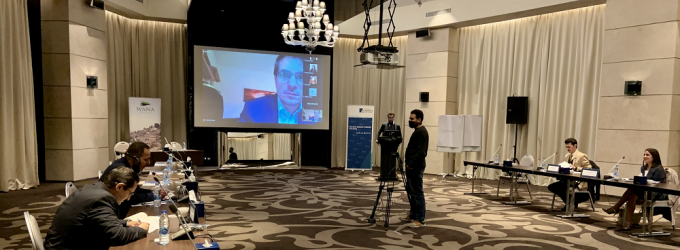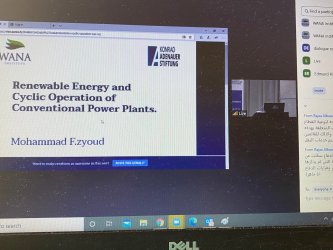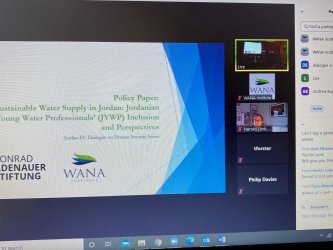-
Roundtable - Jordan-EU Dialogue on Human Security Issues
Roundtable - Jordan-EU Dialogue on Human Security Issues
AMMAN- JORDAN, The West Asia-North Africa (WANA) Institute in partnership with Konrad Adenauer Stiftung (KAS) hosted an interactive roundtable on “Jordan-EU Dialogue on Human Security Issues” on 30 November in Amman. Academic experts, civil society actors, and government representatives participated in the discussions. The goal of the roundtable was to address the public policy-making gaps in Jordan and enhance Jordan-EU dialogue by devising policy recommendations and solutions to issues of relevance.
The roundtable highlighted a joint project entitled: “Jordan-EU Dialogue on Human Security Issues” that seeks to engage with 5-8 young Jordanian experts and professionals from diverse backgrounds to produce public policy papers and present to Jordanian and international stakeholders including government representative and EU representatives.
The session was opened by Ms. Shereen Shaheen, Director of Programme at WANA Institute. She stressed the importance of raising awareness on the issues of importance and priority that Jordan should address, from a non-governmental perspective, cementing the culture of informing and exchanging of knowledge that is able to influence public policies in Jordan as well as deepening the dialogue between the European Union and Jordan on security and human security. Dr. Edmund Ratka, Resident Representative at Konrad Adenauer Stiftung, Jordan Office expressed the importance of this project to strengthening the ties between Jordan with the European Union in general and with Germany in specific.
This roundtable was facilitated by the Senior Researcher at the WANA Institute, Mr. Barik Mhadeen whereby the young professionals presented their papers before policy makers, after having received a specialised training on research and policy-papers writing by the WANA Institute. Ms. Hala Hamawi, an engineer, started her presentation on the water sector in Jordam by stating that she is happy to share the views of the young professionals with the policy makers, yet she regretted that during her investigation she was not able to find data and evidence on the involvement of youth in the sector.
The young professionals, participants of the project, presented their policy papers today tackling issues such as mobilizing sustainable mobility for development (by Amer Qawasmi), the effect of COVID and the Defence law in Jordan (by Tala Halteh), renewable energy and cyclic operation of conventional power plants (by Mohamad Zyoud), sustainable water supply in Jordan (by Hala Hamawi) and finally the liberalisation of the electricity market in Jordan (by Mustafa Hashem). Attending policy-makers were able to put forth their queries, feedback, and recommendations to improve the policy papers which will be amended based on the experts’ information and experience and finally the policy papers will then be complied, edited and published in a joint KAS-WANA publication.
To support this process, it is time to look at how the discourse is being translated in practical steps to deepen the dialogue and cooperation between Jordan and the international community.



